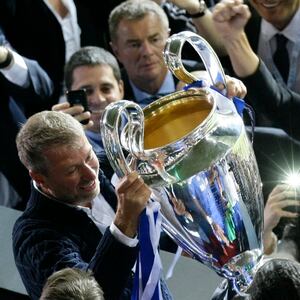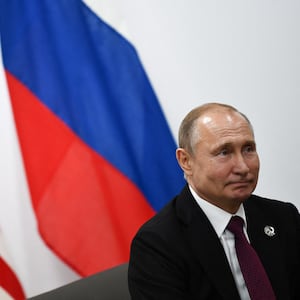Private jets are scrambling to neutral airspace. Superyachts have fled to international waters. Assets hidden by years of financial shell games are being converted into cryptocurrency faster than you can say “до свидания!”
But for Russia’s second-richest man, at least one Western power is still a friendly place to park the fortune he earned with the backing of the Kremlin: the United States of America.
“There’s 120 or so oligarchs. They’ve only hit about 10 of them,” said Bill Browder, an American financier who’s made a crusade out of exposing Russian corruption. “They haven’t even hit the most prominent or famous. Roman Abramovich is still living sanction-free. I don’t know why. There’s no explanation.”
Abramovich—owner of the Chelsea F.C. soccer empire, a pair of yachts worth an estimated $1 billion, and companies that help manufacture the Russian tanks used to invade Ukraine—is just the most prominent of nearly 20 oligarchs who have managed to dodge blanket sanctions by the West, according to an analysis of sanctions measures by The Daily Beast. Of those, nearly a dozen have avoided being sanctioned by the United States, despite President Joe Biden’s State of the Union pledge to join “our European allies to find and seize your yachts, your luxury apartments, your private jets.”
Among the list of sanctions-dodgers is Mikhail Fridman, co-founder of the U.S.-sanctioned Alfa-Bank who has been so frustrated by the economic punishments meted out by Ukraine’s allies that he’s publicly stated that he does “not believe that war would be a solution.”
Kirill Shamalov, who was previously married to the daughter of Russian President Vladimir Putin himself, was only sanctioned by the European Union on Tuesday, after the publication of this story.
These individuals, whose close relationships with Putin’s regime have inextricably tied their fortunes to Russia’s invasion of Ukraine last month, have found themselves on sanctions lists in the United Kingdom and the United States, only to be left alone in the European Union. Or they’ve seen assets frozen in the European Union, while the U.S. and the U.K. have let them be.
In the Venn Diagram of sanctions, it turns out that plenty of Russian oligarchs are avoiding the innermost sections of economic repercussions.
“If you want to effectively lock these individuals and entities—because, of course, some of them have nearly all their assets in LLCs and AGs—you need the hat trick,” one person familiar with the State Department’s pressure campaign to persuade European allies to support sanctions told The Daily Beast. “It only works if all three are working in concert, and that level of cooperation is still lacking.”
In recent days, The Daily Beast has interviewed half a dozen financial crime experts who criticized how the West has been slow to agree on who deserves to be excised from the banking world. They described the extensive efforts Russian billionaires have taken—including hiring lobbyists and engaging in charitable work—to avoid scrutiny.
But in the background, spies and law enforcement agents have quietly been amassing dossiers of their wealth, tying shell companies to asset holders, and mapping out their vastly distributed empires.
Now that Russia’s unprovoked war on the Ukrainian civilian population has unified Western governments, politicians are finally ready to take action on the paperwork these financial intelligence teams have already put together. In the United States, leading the charge is the Treasury Department’s Office of Foreign Assets Control, OFAC, which develops and enforces economic and trade sanctions.
“What’s the big change? Political will,” said Peter Piatetsky, a former OFAC official who investigated Iran’s terrorist financing. “For a long time, these were targets in reserve. And when Putin ordered an invasion a second time, President Biden was like, ‘Who do you have?’ And Treasury went into a reserve and said, ‘Here’s who we’ve been thinking about.’”
For example, although national security experts have long known that Putin spokesman Dmitry Peskov had benefited from the Russian government’s corrupt practices, it wasn’t until March 3 that the State Department officially “designated” him under a Biden executive order that targets those engaged in “efforts to undermine the conduct of free and fair democratic elections.”
And it wasn’t until Friday that the Treasury Department sanctioned Peskov’s wife, Tatiana Navka, as well as his two adult kids, son Nikolay Peskov and daughter Elizaveta “Liza” Peskova.
Liza is among the many Russian Instagram stars who are about to lose access to the beloved social media platform (due to Russia’s own authoritarian information lockdown). Her latest IG post directs followers to her Telegram channel, where she railed against the sanctions and called them a “witch hunt” and declared that she remains “proud that I am Russian.”
“For most of the government, adding people to a watch list is a legal process. They actually have to build up prosecution, and in most cases, classified information is used to make a case,” Piatetsky said. “It’s extremely close collaboration between OFAC and intelligence offices… and you can’t throw a stapler and not hit a lawyer. There’s a lot of oversight. People aren’t just added to a list, willy nilly.”
The U.S., U.K., and EU sanctions are now being updated almost daily, generating round-the-clock work at international banks that are scrambling to review client lists and clamp down on legal exposure. In fact, financial crime experts say these rapid-fire changes have actually created an expectation that sanctions lists will start to mirror each other.
And for some major companies, it’s better to cut off business ties if even a single government sanctions a Russian oligarch or corporate entity, according to Daniel Tannebaum, who leads the global sanctions team for the advisory firm Oliver Wyman in New York.
“You begin to default to the strictest standard,” he said. “I think banks are looking for the most common standard of compliance, not necessarily threading the needle.”
Yet the disparities on the sanctions lists remain glaring. It wasn’t until after the publication of this story that the British government joined the U.S. and EU in sanctioning Russian Defense Minister Sergei Shoigu, despite the rapidly growing body of evidence that the military under his command is purposefully targeting civilians in cities across Ukraine with cluster bombs and thermobaric explosives—weapons that cause more grievous wounds across wider areas populated by non-combatants.
Of those three government entities, only the United States has sanctioned the Russian energy giant Gazprom, which continues to supply fuel to Europe. And yet only the United Kingdom has sanctioned Gazprom’s chairman, Alexey Miller.
The Daily Beast ran the names of more than 100 Russian government officials and billionaires through the “global risk database” of Castellum.AI, a compliance screening tool developed by Piatetsky, the former Treasury official. We then compared the results with the latest versions of the three sanctions lists, which were updated Monday afternoon. Searches were conducted of all Russian billionaires who were defined as “oligarchs” by the State Department in 2018.
Of the 96 Russian oligarchs run through that search, two dozen are under some form of economic sanction following the Russian invasion of Ukraine. But of those 24, only five have been sanctioned by the trifecta of the United States, the United Kingdom, and the European Union. The remaining 19 oligarchs under patchwork sanctions are primarily left off of the U.S. list of sanctioned individuals, with 11 failing to make the American list. Of those, six have already been targeted by both the British and European governments.
The European Union only moved on Alisher Usmanov, whose $600 million yacht was just seized in Germany, on Tuesday, following the publication of this story. He’s the owner of the Kommersant publishing house, co-owner of the massive Russian mobile telephone operator MegaFon, and the man behind Udokan, which operates one of the world’s largest copper deposits.
One senior administration official gave The Daily Beast a “gentle reminder” that “you should never attribute to malice what can be chalked up to bureaucracy,” noting that many of the sanctioned individuals and their families had purposefully shielded both their assets and their closeness with the Putin regime through a complex series of shell corporations and joint ventures.
But the official familiar with the push to synchronize U.S. sanctions with those in Europe told The Daily Beast that there may be a more straightforward answer. The chilling of relations between the United States and its European partners during the Trump administration, amidst threats of withdrawing from the North Atlantic Treaty Organization and an embrace of strongman Putin, strained cooperative efforts with longtime allies.
Anders Åslund, a Swedish economist who documented the country’s widespread corruption in his book Russia’s Crony Capitalism, told The Daily Beast that the North Atlantic partners are only now starting to make up for lost time.
“It was Trump who refused to cooperate with the European Union. It was good under Obama, and Biden has really tried to establish cooperation and repair the damage caused by Trump,” Åslund said. “They are actually coordinating now, while Trump couldn’t care less.”
The official pointed to Biden’s “long game” on refusing to bow to Republican pressure to implement unilateral sanctions on the top executives behind Nord Stream 2, a now-canceled natural gas pipeline between Russia and Germany, without the support of the German government.
“Germany was allowed to come to its own conclusion—the right conclusion—on Nord Stream, and the fact that we didn’t have to bully them into doing so only makes our alliance stronger,” the official said.
A spokesperson for the National Security Council did not respond to requests for comment regarding the discrepancies between the U.S., U.K. and European Union sanctions lists, or whether the Biden administration was working to rectify the gaps in the wall of sanctions he has helped erect.













